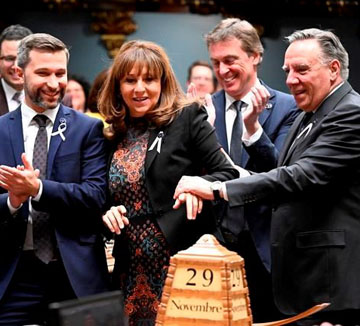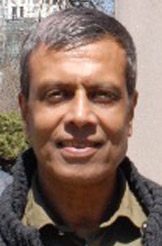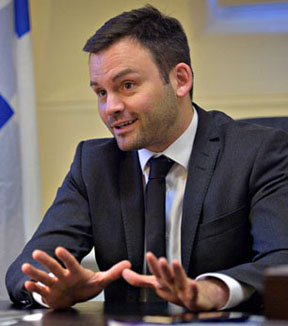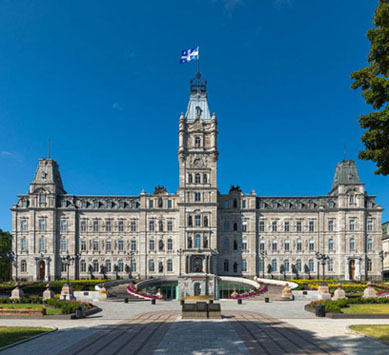What Quebec National Assembly got right when it made traditional oath to British monarch optional
Jan 2nd, 2023 | By Ashok Charles | Category: Canadian Provinces
SPECIAL FROM ASHOK CHARLES, TORONTO/THUNDER BAY. JANUARY 2, 2023. In its November 7, 2022 article, “The empty fight over a symbolic oath in Quebec,” the Globe and Mail’s editorial board argued that the ultimately legislated proposal for Quebec’s National Assembly to dispense with the compulsory oath of allegiance to King Charles III for its members arises from a “misunderstanding.”
According to the Globe’s editors, the ruling of the Ontario Court of Appeal in the 2014 McAteer v. Canada case explains why it is justifiable to require elected representatives and new Canadians to swear an oath of fealty to a British monarch.
The Quebec National Assembly finally made the oath optional on the basis of a straightforward reading. To Quebec’s elected representatives, “I do swear that I will be faithful and bear true allegiance to His Majesty King Charles the Third” means just that.
And, as Parti Québécois leader Paul St-Pierre Plamondon said, requiring democratically-elected representatives of a provincial legislature to swear “allegiance to a foreign king” is an “absurdity.”
The Ontario Court of Appeal disagreed with this principle.
In 2014, Justices Karen Weiler, Peter Lauwers, and Gladys Pardu denied McAteer v. Canada, which would have advanced a legal action to dispense with the oath of allegiance to the monarch as a prerequisite for Canadian citizenship, on the basis that the oath is not what it appears to be.
The justices argued that the appellants’ “plain-meaning” reading of the oath, essentially the same as that of the Quebec legislators, was “incorrect.”
They acknowledged that an interview the appellants included in their filing showed that even a senior manager with Immigration, Refugees and Citizenship Canada, which oversees the administration of the oath in the naturalization process, took it at face value.
Weiler, Lauwers and Pardu, however, thought they knew better.
According to them, the oath of allegiance contains hidden meanings and when you know how to decipher it, the nineteen words don’t pledge fealty to a British monarch at all but are actually:
- an oath to “a symbol of our form of government in Canada” ;
- an oath which “promotes the unwritten constitutional principles of the rule of law and democracy, as well as the values for which this country stands” ;
- “not only a unifying statement but a rights-enhancing one” ;
- “an oath to a domestic institution that represents egalitarian governance and the rule of law.”

Monarchy is democracy, they explained, and fealty to a monarch is a commitment to egalitarianism.
The government of Australia, like the Quebec National Assembly, has also passed legislation regarding the meaning and applicability of the monarchical oath of allegiance.
Previously, Australia’s citizenship oath, much like Canada’s current oath, had pledged,“I swear by Almighty God that I will be faithful and bear true allegiance to Her Majesty Elizabeth the Second, Queen of Australia, Her heirs and successors according to law, and that I will faithfully observe the laws of Australia and fulfill my duties as an Australian citizen.”
In 1994, Australia replaced this oath with a Pledge of Commitment which reads, “From this time forward, I pledge my loyalty to Australia and its people, whose democratic beliefs I share, whose rights and liberties I respect, and whose laws I will uphold and obey.”
It would be silly to argue that Australia’s pre-1994 Oath of Citizenship and the post-1994 Pledge of Commitment elicit the same promises but that is, in effect, what three justices of the Ontario Court of Appeal would have you believe.
The Globe and Mail editorial board bought into their convoluted rationalizations. So did journalist Andrew Coyne who wrote, in a December 8, 2022 Globe and Mail opinion piece, that the oath is a promise to “uphold the country’s system of government.”
The 125 elected members of the Quebec National Assembly, on the other hand, unanimously decided that if it quacks like a duck, waddles like a duck and lays duck eggs, it probably is a duck. And if it pledges fealty to a British monarch, it should be recognized as a pledge of fealty to a British monarch. Their emperor-has-no-clothes view rejects the web of fabricated, unsupported interpretations woven by Justices Weiler, Luwers, and Pardu.
So whose perspective is more compelling — that of a trio of Ontario justices or that of an entire provincial legislature?
As far as I’m concerned, the Quebec National Assembly got it right.

Ashok Charles was born in Madurai, Tamil Nadu, India. He spent his formative years in Thunder Bay, Ontario and is a graduate of Lakehead University. He then moved to Toronto where he graduated from Ryerson University in photographic arts, and has subsequently worked as a freelance photographer.
In the early 21st century Ashok became especially interested in democracy, the Canadian Charter of Rights and Freedoms, and the movement for an independent Canadian head of state. He is now executive director of Republic Now/République du Canada, and can be reached at director@republicnow.ca.



Logic suggests that the natural reply to the Ontario judges is to say that, if X = Y, then it’s perfectly fine to change the oaths to Y, and explicitly pledge allegiance to the rule of law, democracy, and egalitarian government…to Canada, and not a royal family on another continent.
Perhaps it’s time for the matter to be taken to the courts once more, or have our parliaments follow Quebec’s example and legislate.